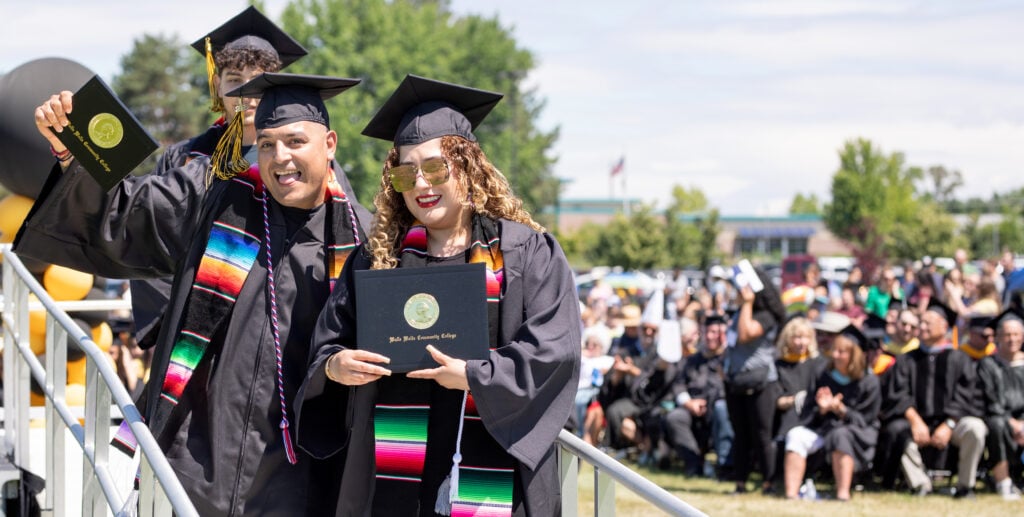As president of Walla Walla Community College, I look forward each spring to congratulating our graduates on a job well done. Recently, I was delighted to shake hands with Victor Angel, a recent WWCC graduate I’ve come to know for his work at the WWCC Welcome Center.
Angel, 36, emigrated with his family from Mexico when he was a freshman in high school. He says he didn’t realize the value of college until he spent 16 years living paycheck to paycheck. While he excelled at his job, Angel was blocked from promotion because he lacked a college degree.
This spring, Angel graduated from WWCC with 30 credits more than he needed to earn an associate degree. His goal is to earn a master’s in social work by the time he’s 40. I have no doubt he will succeed, as Angel, now a father of two, is strongly motivated.
“The best thing we can give to our kids is an education,” he said. “And I want to give that to them.”
Nearly 400 students received a certificate, associate or bachelor’s degree from Walla Walla Community College in June. I’m proud of each and every one of them. Their accomplishments directly benefit their careers, their families and our entire community.
Research shows that individuals who pursue college education enjoy more employment opportunities and have higher earnings potential. A 2022 study by Georgetown University’s Center on Education and the Workforce found the median lifetime earnings of workers with a high school diploma are $1.6 million, while workers with an associate degree earn $2 million and workers with a bachelor’s degree earn $2.8 million.
Approximately 60% of all jobs now require post-secondary education and/or specialized training. That’s why WWCC employees work every day to make college possible for everyone by removing barriers to attendance. For example, WWCC was awarded federal grant money to increase on-campus child care options for students with young children.
We are expanding our Warrior Pledge scholarship program to further ensure that cost is not a barrier for our students. Today, with the Warrior Pledge, along with other private, state and federal grants and assistance available, many WWCC students get 100% of their tuition and fees covered. In fact, most students have a substantial portion of their costs covered.
The college also recognizes that today’s students need and want flexibility. Many are juggling work and family and simply don’t have the ability to devote themselves to a full-time program.
WWCC is expanding hybrid – remote and in-person- — learning options. And we are looking at evening and weekend scheduling, as well as expanding the number of short-term options and certificates we offer. For example, WWCC’s Enology and Viticulture program was exclusively available as a full-time option to students. Beginning with the summer quarter, the program now welcomes students seeking to take as little as one class. We made this change directly in response to community feedback received during our strategic planning process.
We are also looking at all the ways WWCC can customize curriculum to meet the needs of our students. Our Field to Fork curriculum incorporates agricultural sciences, culinary arts and business administration curricula that are aligned and integrated to reflect the reality of today’s professionals working in those fields.
I began this column with an inspiring graduate story and will end with another. (Actually, two). It’s not every day that I can shoot a selfie with a family of graduates. Chloe Moon, 17, received her high school diploma from Walla Walla High School on a Friday and on a Saturday, she joined her mom, April Moon, and me on the graduation stage to receive her associate degree earned through WWCC’s Running Start Program, while April received her associate degree in nursing.
I met April Moon when she was working in a local hair salon. She left that job not long after to devote herself to her studies at WWCC.
A single mom, 40-year-old Moon recently shared that she was “terrified” to give up a job to pursue higher education. Could she pay her bills? Could she pay for tuition? Could she get the grades?
The answer on all three counts: Yes.
“A lot of older people don’t think they can do it financially or intellectually,” she said. “You can. You just have to put in the work.”
WWCC is here to help. We are dedicated to making sure all of our community members are able to access and realize the full value of higher education.

